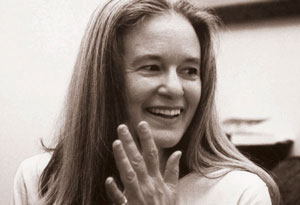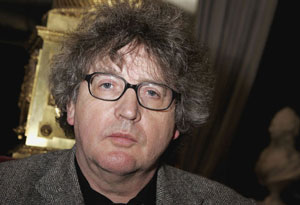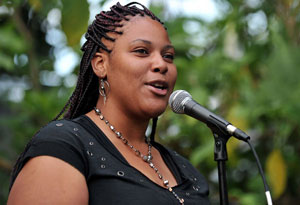
Sharon Olds
We polled Pulitzer Prize winners, poet laureates and professors to get their thoughts on where poems come from.
"Poems come from ordinary experiences and objects, I think. Out of memory—a dress I lent my daughter on her way back to college; a newspaper photograph of war; a breast self-exam; the tooth fairy; Calvinist parents who beat up their children; a gesture of love; seeing oneself naked over age 50 in a set of bright hotel bathroom mirrors." —Sharon Olds, winner of the 1984 National Book Critics Circle Award for The Dead and the Living
"Poetry for me is a little bit like noodling at a piano, or like muttering or shouting when you play a game or dance—almost meaningless little grunts like oh yeah and whoopsy-daisy, and easy does it and watch-it-watch-it-watch-it and yes-yes-yes (or, no-no-no).
—Robert Pinsky, U.S. poet laureate, 1997–2000
"I'm only half joking when I say a stork brings the poems. They are little creatures I have to train and send out into the world."
—Terrance Hayes, winner of the 2010 National Book Award for Lighthead
"When I least expect it something strikes me. Just now, for instance, we were driving westward and stopped at the West Virginia welcome station, and I looked at the woman next to me who tucked her purse between her legs to wash her hands, and that little action triggered something in me—I suddenly thought of all the things we do subconsciously to keep things neat, and the way women carry purses around."
—Rita Dove, winner of the 1987 Pulitzer Prize for Thomas and Beulah
"I think I was just born with iambic pentameter in my veins. Writing poetry is an obsession—who in his or her right mind would become a poet?"
—Maxine Kumin, U.S. poet laureate, 1981–1982

Paul Muldoon
"The idea that poetry comes from beyond oneself is vital, as is the sense that one writes a poem in a condition that is often associated with a spiritual position, i.e., the condition of humility. One doesn't know what one's doing and is inspired in that respect. But it doesn't mean one's completely inert, or passive; rather it's just about allowing a poem to come from wherever it comes from and getting it into the world."
—Paul Muldoon, winner of the 2003 Pulitzer Prize for Moy Sand and Gravel
"I feel my way into a poem. Ther is no topic that is taboo. And even if I were to avoid certain topics, they would return to me, beckoning, and demanding to be written."
—Yusef Komunyakaa, winner of the 1994 Pulitzer prize for Neon Vernacular
"There seem to be no deals you can make with poetry to entice it out of its lair. A poem, actually any writing, is always a private thing, and that is how I begin. It must have that secret source."
—Michael Ondaatje, author of The English Patient and 12 poetry books
"There seem to be no deals you can make with poetry to entice it out of its lair. A poem, actually any writing, is always a private thing, and that is how I must begin. It must have that secret source."
—Billy Collins, U.S. poet laureate, 2001–2003
"You have to pay attention to what's said and what's not said, and what's done and not done. And that creates curiosity. You go to that what if. And that what if takes you into the poem."
—Nikki Giovanni, University Distinguished Professor of English, Virginia Tech
—Paul Muldoon, winner of the 2003 Pulitzer Prize for Moy Sand and Gravel
"I feel my way into a poem. Ther is no topic that is taboo. And even if I were to avoid certain topics, they would return to me, beckoning, and demanding to be written."
—Yusef Komunyakaa, winner of the 1994 Pulitzer prize for Neon Vernacular
"There seem to be no deals you can make with poetry to entice it out of its lair. A poem, actually any writing, is always a private thing, and that is how I begin. It must have that secret source."
—Michael Ondaatje, author of The English Patient and 12 poetry books
"There seem to be no deals you can make with poetry to entice it out of its lair. A poem, actually any writing, is always a private thing, and that is how I must begin. It must have that secret source."
—Billy Collins, U.S. poet laureate, 2001–2003
"You have to pay attention to what's said and what's not said, and what's done and not done. And that creates curiosity. You go to that what if. And that what if takes you into the poem."
—Nikki Giovanni, University Distinguished Professor of English, Virginia Tech

Azure Antoinette
"I don't have any method. But I like to talk to people and find out what their story is—and then just listen."
—Azure Antoinette, spoken-word poet
"When you go to bed, you can't force a dream, right? In fact, the dream is a gift because it's a surprise. There are different theories about where dreams come from, but a general one is that the day's residue often becomes the little grain of sand around which the dream will then build. i think a poem is like that."
—Timothy Liu, author of eight poetry collections
"They come from my wanting to write them. I want to make something. The way I work is I start, and then something starts to happen. In other words, I have to mehanically, intentionally, and willfully begin."
—Kay Ryan, U.S. poet laureate, 2008–2010
"I think lines of poetry come to you whenever they come. You could be waiting for the dentist and suddenly you'll get an image or a line and you write it down. I write on the backs of envelopes, parking tickets—whatever I have at hand because you cannot lasso the muse. I really believe you can't force a lot of this. Now, I passionately believe in revision, and that you have to try to write in a disciplined way as much as you can. But I do think there are moments that you suddenly get something, given to you as a gift from the imagination, and you have to honor those moments as well."
—Carol Muske-Dukes, California Poet Laureate and professor of English and Creative Writing at the University of Southern California
More from O's poetry issue
—Azure Antoinette, spoken-word poet
"When you go to bed, you can't force a dream, right? In fact, the dream is a gift because it's a surprise. There are different theories about where dreams come from, but a general one is that the day's residue often becomes the little grain of sand around which the dream will then build. i think a poem is like that."
—Timothy Liu, author of eight poetry collections
"They come from my wanting to write them. I want to make something. The way I work is I start, and then something starts to happen. In other words, I have to mehanically, intentionally, and willfully begin."
—Kay Ryan, U.S. poet laureate, 2008–2010
"I think lines of poetry come to you whenever they come. You could be waiting for the dentist and suddenly you'll get an image or a line and you write it down. I write on the backs of envelopes, parking tickets—whatever I have at hand because you cannot lasso the muse. I really believe you can't force a lot of this. Now, I passionately believe in revision, and that you have to try to write in a disciplined way as much as you can. But I do think there are moments that you suddenly get something, given to you as a gift from the imagination, and you have to honor those moments as well."
—Carol Muske-Dukes, California Poet Laureate and professor of English and Creative Writing at the University of Southern California
More from O's poetry issue
Photo: Courtesy of Sharon Olds




